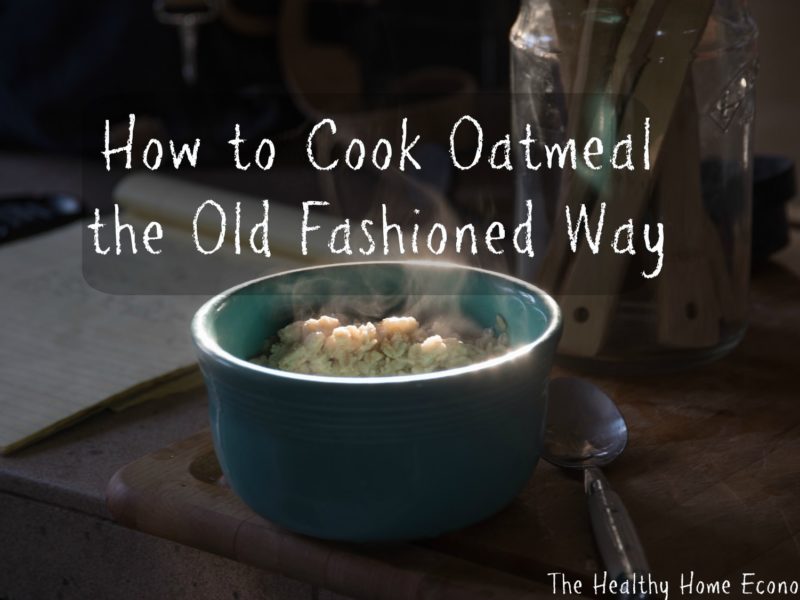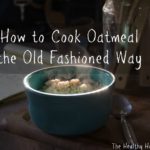How to soak and cook oatmeal the traditional way, aka “overnight oats” for a digestible and nourishing breakfast that will keep you feeling full all the way to lunch!

How do you cook oatmeal the healthiest way possible? Is it acceptable to cook it in the microwave, quickly poured out of convenient, ready to use packets? Do you think this is a healthy start to the day?
Reality Check: Ripping open a package of instant oatmeal, pouring it in a mug with some water and nuking it in the microwave for a couple of minutes is NOT a nourishing breakfast! And guess what … you will feel hungry again about an hour later!
Don’t get me wrong here – oatmeal can and should be a healthy breakfast!
How you choose to cook oatmeal, however, is the critical step that most people completely miss and which determines how much nourishment and benefit you will actually derive from the experience. It is one of the most important cooking skills to learn yourself and teach children before they leave home.
Preparation determines how long the oatmeal will fill you up. What good is a bowl of oatmeal if you are hungry again and ready for a donut fix by 10 am?
Overnight Oats the Traditional Way
Learning to prepare overnight oats as practiced for centuries by ancestral societies will take a little planning on your part. But, you will be greatly rewarded with a much more nourishing, digestible breakfast that will stay with you all the way to lunchtime!
Traditional peoples knew through observation that grains were very hard to digest and caused health problems over time for those who consumed them without careful preparation.
Throwing out those boxed breakfast cereals that are at least twice as expensive per serving and toxic to boot and replacing with a simple, nutritious bowl of porridge will also help your food budget considerably with no loss in pleasure or enjoyment particularly on chilly winter mornings!
TIP: I’ve had people email me to complain that when you cook oatmeal by first soaking for at least 7 hours or overnight, it results in a sour tasting porridge. I’ve found that soaking in water plus lemon juice produces a delightful and slightly lemony porridge that is not sour at all and absolutely pops with flavor! If you still need help adjusting to the taste of soaked oatmeal, the linked article plus video will share an easy way to slowly adapt.

How to Cook Oatmeal (traditional method)
The traditional method for preparing overnight oats and cooking oatmeal the next morning that results in a bowl of porridge that is very digestible, filling and nourishing compared to modern convenience methods.
Ingredients
- 1 cup rolled oats preferably organic
- 2-3 cups filtered water
- 1-2 Tbl lemon juice optional
- 1/2 tsp sea salt
Instructions
-
Mix the oats, 2 cups of water, and lemon juice in a pot. Cover and leave on the counter (NOT in the refrigerator) for at least 7 hours or overnight. If you have trouble digesting grains, feel free to soak for as long as 24 hours.
-
When soaking is complete, add 1/2-1 cup additional filtered water to the pot. Bring to a boil with the salt. Cook oatmeal thoroughly for 5 minutes. You do not need to rinse the oats before cooking.
-
Traditional oatmeal is best served with butter and/or cream for optimal assimilation of minerals. A natural sweetener, nuts, raisins or other fruit may be added as desired.
-
Refrigerate leftovers.
Recipe Video
Recipe Notes
Store bought or homemade apple cider vinegar, yogurt, or kefir may be substituted for the lemon juice.
If you are just starting to soak oatmeal for breakfast, feel free to just soak with water at first and gradually build up to the 4 tablespoons of recommended acidic medium (I prefer lemon juice).
Detailed Video Tutorial
In this longer video below, I show you exactly how I cook rolled oats into oatmeal.
It requires the initial step of soaking the night before. Then, it cooks up quickly the next morning!
Be sure to refrigerate any leftovers for a fast warm-up on the stove on subsequent mornings.
No Rinsing Required
You do not need to rinse the soaked oats before cooking. The antinutrients are deactivated, so no further effort is needed other than simmering for a few minutes on the stove!
I do not recommend soaking oat groats. The linked article explains why.
Soaked Oats vs Sprouted
If you don’t think you can manage the two minutes it takes before you go to bed to put on a pot of oatmeal to soak, this article shows you how to prepare traditional oatmeal without soaking using sprouted rolled oats instead.
This article on sprouting vs soaking explains the differences nutritionally and digestively speaking.
More Soaked Porridges to Enjoy!
If you find overnight oats to be enjoyable and more digestible, try amaranth breakfast cereal, teff porridge and buckwheat hot cereal too.








I am going to try this tonight, I find that just soaking them in protein overnight and eating them at the moment isn’t filling me up at all and neither is just adding water to the oats and cooking them in the microwave. Hopefully this will resolve my issue as im always hungry even after eating a cup!
Two things… One, I found that mixing in some baking soda before cooking (mix w/ water to dissolve then mix into the oats) totally takes out the sour taste. yay! 2nd, in Nigel’s tooth book, he mentions that oats have very little phytase on their own – so they don’t break down the phytic acid by themselves very well. It is best to add something with a high phytase content to get the process moving (wheat flour, rye flour or.. I think buckwheat for gluten free)
From my understandng of soaking grains, after soaking grains overnight with an acidic medium, you throw out the soaking liquid the next day and rinse. Then you cook it.
Gudrun B gave an explanation (a few comments up) that summarizes perfectly what I have studied. You CAN rinse your soaked grains for flavor (assuming they haven’t soaked up all your liquid), but you don’t need to for nutrition, because the anti-nutrient complex has been changed into accessible nutrients.
This is true for all grains, whether whole, rolled, cracked or flour (though if they have been heated as in the case of most rolled grains, it seems that enzymes would be dead, making the addition of wheat/spelt/buckwheat flour to ensure the presence of phytase more important).
I love what I am learning from so many great questions and comments! Especially those that make this all seem so simple and logical. LIFESAVERS for busy Mommies! 🙂
A few more thoughts for latecomers in this conversation (like me):
soaking in warm water gives the process a head start, especially in a cooler house. Starting with cold water requires hours before reaching room temperature, where the enzyme process works best.
In my experience, buying grains in bulk bins is a good idea, especially at a store where inventory moves through quickly. Most of these stores receive shipments weekly or more often, and foods can be looked over (and smelled) to ensure quality. For things I use regularly, I prefer to buy 50 pounds or more so I know I’ll have it on hand, but nutritionally speaking (and with variety grains I use less often), I love that bulk bins make it possible to pay less without purchasing more than I can use quickly.
One more tip to add: if you are using an aluminum pan you do NOT want to be soaking your oats with an acid in it overnight, as the acid will absorb some of the aluminum.
Thank you for sharing this information and for making it so simple.
I am wondering if I should be soaking my oats for a granola bar recipe. Do I soak and then bake them to dry?
I always soak mine and then dry them in the dehydrator before using them in other recipes such as cookies or snack bars so they maintain their crunch. You could do the same in your oven by putting it on the lowest setting and if necessary, cracking the door open to keep it from getting too hot.
Does anyone know how long it would take in the oven (say at 175) to dry out the soaked oatmeal? I would like to try this. Does the soaked and dried oatmeal work the same in baked goods?
I thought that if you boiled your food, then it kills the enzymes. So why wouldnt you just eat the oatmeal raw, after it has soaked?
Do you have any info on oats that are not rolled? i.e. oat groats or steel-cut?
I’m confused why you don’t rinse the oats after soaking them. Don’t the phytates break down into the water? Wouldn’t you just be consuming the phytates if you didn’t rinse the oats? Or maybe that’s not how it works … Thanks.